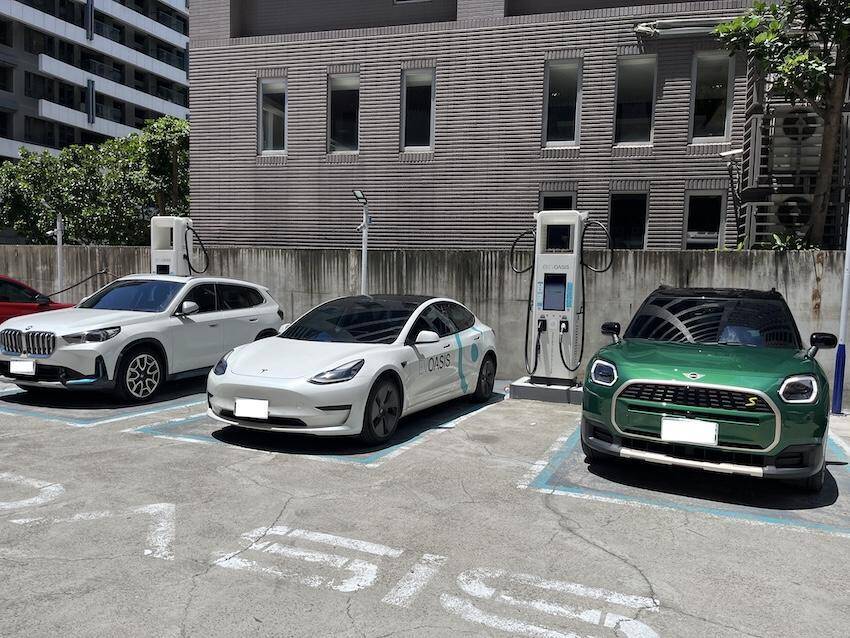The Executive Yuan yesterday approved proposed amendments to extend commodity and vehicle license tax breaks for electric vehicles (EVs) by five years to Dec. 31, 2030.
Premier Cho Jung-tai (卓榮泰) told a Cabinet meeting that the extension aims to help Taiwan meet its 2030 vehicle electrification goal and advance its long- term vision of net zero emissions by 2050, Cabinet spokesperson Michelle Lee (李慧芝) said.
The proposed amendments to the Commodity Tax Act (貨物稅條例) and Vehicle License Tax Act (使用牌照稅法) are to be sent to the Legislative Yuan for review.

Photo: Taipei Times
At present, fully electric vehicles are exempt from commodity taxes upon registration, up to a maximum taxable value of NT$1.4 million (US$46,500) for sedans.
Any amount exceeding that value remains taxable, Ministry of Finance Taxation Administration Director-General Sung Hsiu-ling (宋秀玲) said.
Local governments are authorized to provide tax exemptions for vehicle license taxes, she added.
From January 2011 to July this year, about 890,000 EVs benefited from commodity tax exemptions totaling NT $25.8 billion, while 110,000 vehicles were exempt from NT$9 billion in license taxes, Sung said.
The measures helped cut carbon dioxide emissions by an estimated 1.02 million tonnes between 2022 and last year, she said.
The EV industry also generated NT$100 billion in output value annually and created more than 16,500 jobs, she added.

The first global hotel Keys Selection by the Michelin Guide includes four hotels in Taiwan, Michelin announced yesterday. All four received the “Michelin One Key,” indicating guests are to experience a “very special stay” at any of the locations as the establishments are “a true gem with personality. Service always goes the extra mile, and the hotel provides much more than others in its price range.” Of the four hotels, three are located in Taipei and one in Taichung. In Taipei, the One Key accolades were awarded to the Capella Taipei, Kimpton Da An Taipei and Mandarin Oriental Taipei. Capella Taipei was described by

The Taichung District Court yesterday confirmed its final ruling that the marriage between teenage heir Lai (賴) and a man surnamed Hsia (夏) was legally invalid, preventing Hsia from inheriting Lai’s NT$500 million (US$16.37 million) estate. The court confirmed that Hsia chose not to appeal the civil judgement after the court handed down its ruling in June, making the decision final. In the June ruling, the court said that Lai, 18, and Hsia, 26, showed “no mutual admiration before the marriage” and that their interactions were “distant and unfamiliar.” The judge concluded that the couple lacked the “true intention of

EVA Airways today confirmed the death of a flight attendant on Saturday upon their return to Taiwan and said an internal investigation has been launched, as criticism mounted over a social media post accusing the airline of failing to offer sufficient employee protections. According to the post, the flight attendant complained of feeling sick on board a flight, but was unable to take sick leave or access medical care. The crew member allegedly did not receive assistance from the chief purser, who failed to heed their requests for medical attention or call an ambulance once the flight landed, the post said. As sick

INDUSTRY: Beijing’s latest export measures go beyond targeting the US and would likely affect any country that uses Chinese rare earths or related tech, an academic said Taiwanese industries could face significant disruption from China’s newly tightened export controls on rare earth elements, as much of Taiwan’s supply indirectly depends on Chinese materials processed in Japan, a local expert said yesterday. Kristy Hsu (徐遵慈), director of the Taiwan ASEAN Studies Center at the Chung-Hua Institution for Economic Research, said that China’s latest export measures go far beyond targeting the US and would likely affect any country that uses Chinese rare earths or related technologies. With Japan and Southeast Asian countries among those expected to be hit, Taiwan could feel the impact through its reliance on Japanese-made semi-finished products and